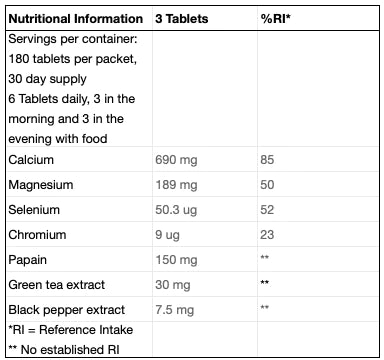When it comes to maintaining overall wellness, there's a key player that doesn't often get the limelight it deserves: magnesium. This mineral is vital to many processes in our bodies, and yet, according to studies, a significant portion of the population doesn't get enough of it. Here, we're going to delve into some science-based reasons why magnesium is critical to bodily functions and overall wellness.
1. A Key Player in Energy Production
First and foremost, magnesium is essential for the production of ATP (adenosine triphosphate), the energy currency of our cells. Without adequate magnesium, the enzymes that produce ATP cannot function optimally, leading to decreased energy and fatigue. In simpler terms, without magnesium, we wouldn't have the energy needed to carry out day-to-day activities.
2. Bone Health
Magnesium plays a crucial role in bone health. Around 60% of the body's magnesium is stored in the bones, contributing to their strength and structure. It also helps with the absorption of calcium into the bone and acts in concert with vitamin D, a crucial nutrient for bone health. Without sufficient magnesium, our bones can weaken over time, increasing the risk of osteoporosis.
3. Heart Health
Magnesium is essential for maintaining a healthy heart rhythm and preventing hypertension (high blood pressure), both of which reduce the risk of heart disease. It relaxes the muscles of the heart and blood vessels, contributing to smoother blood flow. Additionally, magnesium aids in the metabolism of other heart-friendly nutrients like potassium and calcium.
4. Muscle Function
Magnesium is a natural relaxant and plays a key role in muscle function. It aids in muscle contraction and relaxation, helping to prevent muscle cramps and spasms. Whether you're an athlete or someone who spends a lot of time at the desk, maintaining adequate magnesium levels can help alleviate muscle tension and discomfort.
5. Nervous System Regulation
Magnesium is crucial for nervous system regulation. It functions as a gatekeeper for NMDA receptors, which are involved in brain development, memory, and learning. An overload of these receptors can lead to neuronal damage and various neurological disorders. Magnesium, acting as a natural blockade, helps regulate these receptors, contributing to a healthier nervous system.
6. Blood Sugar Control
Research shows that magnesium plays an important role in regulating blood sugar levels and insulin activity. A deficiency of this nutrient could, therefore, increase the risk of type 2 diabetes. Sufficient magnesium intake helps improve insulin sensitivity, keeping your blood sugar levels steady, which is crucial for overall health.
7. Mood Regulator
Magnesium plays a role in brain function and mood regulation. Studies suggest that it may help mitigate symptoms of depression and anxiety. It is involved in several neurotransmitter pathways, like the production of serotonin – the 'feel-good' hormone. Therefore, maintaining adequate magnesium levels can be beneficial for overall mental health.
8. Digestive Health
Magnesium aids digestion by acting as a co-factor for enzymes involved in the digestion process, helping break down food and absorb nutrients. Moreover, it can alleviate constipation by drawing water into the intestines, softening stool, and encouraging bowel movements.
9. Migraine Prevention
Some studies suggest that individuals who suffer from migraines often have lower levels of magnesium compared to those who do not. Magnesium supplements have been shown to be somewhat effective in helping to prevent migraines, perhaps due to its role in neurotransmitter release and vasoconstriction.
How Much Magnesium Do You Need? Do You Need More If You Are An Athlete?
Magnesium needs can vary based on age, sex, and level of physical activity. The EFSA recommends a daily intake of 350mg for men and 300 mg for women.
For typical adults who are moderately active, these recommended amounts should suffice. However, athletes or those engaging in high-intensity physical activities might need more, as magnesium is lost through sweat and used in energy metabolism during intense exercise.
While there isn't a specific guideline for athletes, some sports nutritionists suggest that athletes may need 10-20% more magnesium than the recommended daily amount, making the daily intake somewhere between 350-500 mg for most athletes and some may need much more due to their sport and length of training.
It's important to note that while it's crucial to ensure adequate magnesium intake, it's equally important to avoid excessive consumption. Too much magnesium, especially from supplements, can cause digestive issues such as diarrhea and abdominal cramping. In severe cases, it can lead to irregular heartbeat and cardiac arrest.
As always, it's best to consult with a healthcare provider or a sports nutritionist to determine the right amount of magnesium intake for your specific needs. Remember, the primary source of magnesium should be a balanced diet rich in magnesium-containing foods. Supplements should be considered when dietary intake is not sufficient.
What Foods In a Typical Diet Contain Magnesium?
Several common foods are excellent sources of magnesium. Here are some of the top choices for foods high in magnesium:
- Green Leafy Vegetables: Spinach, kale, and Swiss chard are high in magnesium. They are also rich in other nutrients, making them a healthy choice overall.
- Legumes: Foods like black beans, chickpeas, lentils, and edamame contain high amounts of magnesium.
- Nuts and Seeds: Almonds, cashews, and peanuts are particularly high in magnesium. Pumpkin, flax, and chia seeds also contain substantial amounts.
- Whole Grains: Foods like brown rice, quinoa, and whole wheat bread are good sources of magnesium.
- Fish: Certain types of fish, such as mackerel, wild salmon, and halibut, are high in magnesium.
- Dark Chocolate: Dark chocolate is surprisingly high in magnesium, with around 64 mg in a 1-ounce serving. However, it's also high in calories and sugar, so it should be consumed in moderation.
- Avocados: These are not only high in healthy fats but also a good source of magnesium.
- Bananas: While not as high in magnesium as some other foods, bananas are a good source of magnesium (and potassium), particularly for a fruit.
- Yogurt and Kefir: Dairy products, such as yogurt and kefir, contain a good amount of magnesium.
-
Tofu: This staple for vegetarians and vegans is rich in magnesium and is a good source of protein.
As always, try to get as many nutrients from a varied, balanced diet. If you have concerns about your magnesium levels or you're considering taking a supplement, consult with your healthcare provider or a sports nutritionist. They can provide advice based on your specific dietary needs and health status.
Does Magnesium Benefit Sleep?
Magnesium plays a crucial role in promoting restful sleep in several ways:
- Regulates Neurotransmitters: Magnesium is involved in the regulation of neurotransmitters, which are chemical messengers in the brain. It helps control the release of calming neurotransmitters like gamma-aminobutyric acid (GABA). GABA reduces neuronal excitability, promoting relaxation and sleep.
- Maintains Healthy Levels of Melatonin: Magnesium plays a role in maintaining healthy levels of melatonin, the hormone responsible for regulating sleep-wake cycles. Balanced melatonin levels are essential for a good night's sleep.
- Reduces Inflammation: Some research suggests that magnesium may decrease inflammation, which has been linked to poor sleep and insomnia.
- Relieves Muscle Tension: Magnesium aids in muscle relaxation, which can help create a state of physical relaxation conducive to sleep.
- Alleviates Stress and Anxiety: Magnesium has been found to reduce stress and anxiety, both of which can interfere with sleep. It's involved in the functioning of the hypothalamic-pituitary-adrenal (HPA) axis, a set of three glands that control our reaction to stress.
Overall, adequate magnesium intake may improve sleep quality, especially for those who have insomnia. Some studies suggest that supplementing with magnesium can help improve sleep quality and efficiency, increase sleep time, and reduce early morning awakenings.
How Can You Determine If You Are Low in Magnesium?
Magnesium deficiency, known as hypomagnesemia, can be difficult to diagnose because the symptoms often are subtle or can be attributed to other causes. However, if your magnesium levels are significantly low, you might experience the following symptoms:
- Muscle Twitches and Cramps: These can be early signs of a deficiency. In extreme cases, it can lead to seizures or convulsions due to an overexcitement of nerve impulses.
- Osteoporosis: While this condition has multiple causes, a deficiency in magnesium may contribute as it affects bone health and calcium metabolism.
- Fatigue and Muscle Weakness: This is a non-specific symptom and can be a sign of many conditions, but people deficient in magnesium often report fatigue and muscle weakness.
- High Blood Pressure: Animal studies show that magnesium deficiency can lead to high blood pressure. Some human studies also suggest that a higher magnesium intake can lead to a lower risk of high blood pressure.
-
Irregular Heartbeat: In severe cases, magnesium deficiency can lead to irregular heartbeat, which can be accompanied by lightheadedness, shortness of breath, and chest pain.
It's important to note that these symptoms do not necessarily indicate a magnesium deficiency, as they can be associated with other health conditions. Therefore, it's critical to consult with a healthcare provider if you are experiencing these symptoms.
Magnesium Supplements: The Different Forms and Usages
Choosing a magnesium supplement can be a little confusing as there are several different forms available, each with different absorption rates and uses. Here are some points to consider when choosing a magnesium supplement:
- Types of Magnesium: Magnesium supplements come in several forms, including magnesium citrate, magnesium oxide, magnesium glycinate, magnesium chloride, and magnesium malate, among others.
- Magnesium Citrate: This form is highly bioavailable and often recommended for those who need to correct a deficiency. It may also help with digestion issues as it has a laxative effect.
- Magnesium Glycinate: This form is highly bioavailable and gentle on the stomach. It's a good choice for those looking to support nerve and muscle function without a laxative effect.
- Magnesium Oxide: This form has lower bioavailability but provides a large amount of elemental magnesium per dose. It's often used in over-the-counter antacids and is commonly used to relieve constipation.
- Magnesium Hydroxide: This form can act as an antacid, neutralizing stomach acid.
- Magnesium Chloride: This form is less common but is often used topically in lotions or oils. It is also available for oral consumption and has moderate bioavailability.
- Magnesium Malate: This form is often recommended for people with fibromyalgia or chronic fatigue syndrome, as malate (malic acid) is involved in energy production at a cellular level.
- Dosage: The recommended dietary allowance (RDA) for magnesium is 300-350 mg for adults, depending on age and gender. Some supplements can contain much more than this and may support athletic performance.
- Absorption and Bioavailability: Bioavailability refers to how well a supplement is absorbed and used by your body. Some forms of magnesium are better absorbed than others.
- Purity and Quality: Choose supplements from a reputable brand that adheres to Good Manufacturing Practices (GMP). Some brands also have third-party testing for quality assurance such as Informed Sport.
- Complementary Ingredients: Some magnesium supplements contain additional ingredients like vitamin D or calcium, which work together with magnesium in the body.
In conclusion, magnesium is an indispensable mineral that plays a critical role in a myriad of our body's vital functions, ranging from energy production and DNA synthesis to muscle and nerve function, heart health, and even mood regulation. It is also essential for the proper absorption and functioning of other important nutrients such as calcium, potassium, and vitamin D. Because of these multifaceted roles, maintaining adequate magnesium levels is crucial for our overall health and wellness.
However, it's important to note that those with higher physical demands, such as athletes, may require more magnesium than the average person. This is due to the additional magnesium lost in sweat and used in energy metabolism during strenuous exercise. As such, it is vital to ensure sufficient magnesium intake, either through diet or supplements, to meet these increased needs and support optimal athletic performance.
Whether you're an athlete or just someone looking to improve your health, understanding the significance of magnesium in your bodily functions can guide you in making more informed choices in achieving and maintaining your overall health and wellness.









